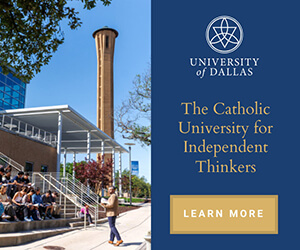All of us are called by Christ to share the truth of the Catholic faith in our own particular time. And sometimes discussions about Catholic doctrine happen in places you wouldn’t expect. Recently on Twitter, there has been a lot of discussion about the omniscience of Jesus – particularly if Jesus knew He was God.
Patrick Madrid took some time on The Patrick Madrid Show recently to explain what the Catholic Church teaches on the topic of Jesus’ human and divine nature, and whether Jesus was aware of His divine nature and salvific mission. Patrick said:
“God became one of us. He didn’t put on a human costume, He wasn’t 50% divine and 50% human. In Christ Jesus, the 2nd person of the Holy Trinity became flesh. He is 100% divine and 100% human. What that means is that the two natures are utterly united. How that is, we can’t really understand, because there is nothing to compare it to.
As God and man, Jesus in His divine intellect knows everything. There is nothing He doesn’t know, because He is God. His knowledge is infinite, it’s unlimited, it’s perfect.
Let me share with you the teaching of the Catholic Church on this topic. You can begin reading this in the Catechism of the Catholic Church at about paragraph 470. The subheading there is “How is the Son of God Man?” And here’s what it says:
Because “human nature was assumed, not absorbed”, in the mysterious union of the Incarnation, the Church was led over the course of centuries to confess the full reality of Christ’s human soul, with its operations of intellect and will, and of his human body. In parallel fashion, she had to recall on each occasion that Christ’s human nature belongs, as his own, to the divine person of the Son of God, who assumed it.
Let’s break down what this is saying. You are a human being. You have a body, you have a will, you have a human nature, you have all the things that are appropriate to a human nature – a body, a soul, an intellect, and a will. And it is you who have them. You are the subject.
Now, in the Incarnation, the 2nd Person of the Blessed Trinity became incarnate. Incarnate is from the Latin word for ‘meat’ or ‘flesh.’ He ‘took flesh’ as we say in the Creed every Sunday. God did not put on a human costume and then walk around pretending to be one of us. He became one of us.
The Son of God worked with human hands, He thought with a human mind, He acted with a human will, and with a human heart He loved. Born of the Virgin Mary, He has truly been made one of us, like to us in all things except sin. That’s the one thing that Jesus is not like you and me in, because He never committed a sin. Why did He never commit a sin? Because He’s God. And because His human nature is perfectly united to His divine nature, and His human will is perfectly conformed to His divine will.
So any truth, any doctrinal issue, that would be taught by Jesus is coming from His divine person. Jesus is a divine person, who has both a divine nature and a human nature. So Jesus, although He has two natures, although He has two wills, He is not two persons. You don’t have the human person of Jesus and the divine person of God. The divine person is the subject of both natures.
Back to the Catechism:
By its union to the divine wisdom in the person of the Word incarnate, Christ enjoyed in his human knowledge the fullness of understanding of the eternal plans he had come to reveal. What he admitted to not knowing in this area, he elsewhere declared himself not sent to reveal.
So that’s the solution to the passages where Jesus says that not even the Son knows the day or the hour, suggesting to some people that He wasn’t really God. Jesus was not sent by the Father to reveal that information, and so at times you see an emphasis on His human nature, human knowledge. And at times you see the emphasis on His divine nature.
But the key point here, lest anybody be confused on this issue, is that Jesus knew He was God. He always knew He was God. His human nature always enjoyed the Beatific vision. He didn’t need to be schooled by anyone when it came to these eternal truths, these divine doctrines that He had been sent to reveal.
Now I’m going into a lot of detail, but it’s worth it. This is so worth it for us to be really clear on what we believe about Jesus. After all, if you don’t know why you believe what you believe about who Jesus Christ is, you’ll be hard-pressed to defend it when the going gets tough, and you’ll also be much more susceptible to being confused by aberrant theology that’s packaged in a asleek and plausible way.”
Listen to the full discussion below:
The Patrick Madrid Show airs weekdays from 9:00 – noon Eastern/6:00 – 9:00 a.m. Pacific on Relevant Radio®.


